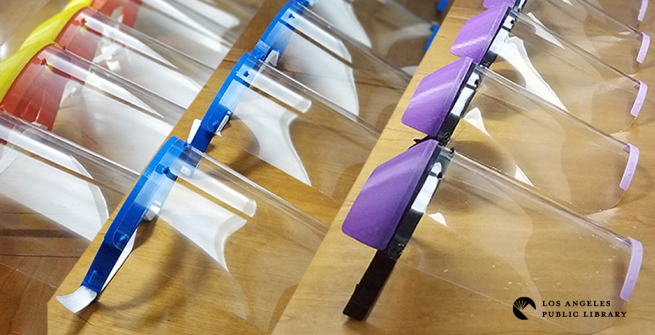When the library's Octavia Lab opened in June of 2019, it was envisioned as a collaborative work-space for creatives, makers, and hobbyists. Now, as COVID-19 has forced the closure of the library to the public, the Octavia Lab has a new function and focus; fabricating personal protective equipment (PPE) for medical professionals.
Early on in the crisis, the Octavia Lab received inquiries about 3D printing PPE for local hospitals. The mayor’s office received the same inquiry and the manager of the Octavia Lab, Vi Ha, got down to work, figuring out what to make. The maker community is a collaborative one, and designs for models to make were readily available. The lab settled on making what is known as a Prusa Face Shield. Prusa is a brand of 3D printers. The code is open source at their website.

From the very start, the Octavia Lab has had a very important partner in all this; the Los Angeles Clean Incubator. LACI, as a tech accelerator, has much experience prototyping and was able to communicate and create quickly to gain hospital approval for our prototypes. LACI and Octavia Lab also coordinated their communication with health care providers regarding what was needed in terms of PPE. With LACI’s help, the library was able to decide on a prototype the Lab could build and hospitals could accept.
LACI has an extensive machine shop, Advanced Prototyping Center, that is able to do work in fabrication. LACI coordinated with Octavia Lab staff on designs and was able to help with the cutting of the clear plastic for the shields with a water jet cutter, which is a much cleaner and safer method of cutting the plastic unlike a laser cutter.
Once we received the enthusiastic go ahead from City Librarian John Szabo, Deputy City Librarian Susan Broman, and Central Library Director Kren Malone, Octavia Lab staff started the process of figuring out how to set up the lab and how to make it safe since social distancing practices and as close to sterile manufacturing processes need to be used. Since 3D printers heat up their PLA filament to 220 degrees, parts are sterile as they come out of the printer.
Vi Ha headed up the team along with Kurt Thum, Luci Odono, and Diana Ramirez Hidalgo. Volunteer par excellence Francis Fayard, a 3D printing expert with a Master’s Degree in Eco-design, diligently focused on adapting the files to work on the library’s printers.

In the spirit of community building in the time of great need, we are working with helpful folks and institutions throughout the Los Angeles area. The Glendale Public Library has generously donated us the use of their 6 3D printers (5 Ultimakers and 1 Lulzbot). We also have hobbyist 3D printers who are printing from their home machines. Because of the disruption to the supply chain and the difficulty of getting face frame making supplies, we have received donations of elastic, foam and 3D printing filament from the community.
The 3D printers are only used to make the plastic headband and chin protector of the shield. The rest is just clear plastic .02 PETG that is cut to make a shield. The shield is then held in place with a strap in the back that is made out of elastic, but just about any kind of fabric can be used.

Staff then assemble the masks, place them Zip-Loc ® bags, and get them ready for shipping. The process is kept as clean as possible, but to be safe, we advise hospital staff to wait 72 hours before any shield is used.

Octavia E. Butler’s, for whom the lab is named, saw a time like today’s in her novel The Parable of the Sower. In that book, it's climate change that has created a nearly unlivable world in the 2020s. But the ability to adapt to our changing circumstances with empathy and kindness, to embrace diversity, and communicate with each other can be a saving grace, even in rough times.
 Staff member Lucia modeling the face shield with parts made in the Octavia Lab
Staff member Lucia modeling the face shield with parts made in the Octavia LabWe hope that the Octavia Lab’s work, in some way, makes our current world just a little bit better than we’ve found it.
If you want to help out in this process, visit our Lab pages for more information, and you can always send an email to octavialab@lapl.org for any questions.
Special thanks to Vi Ha and Andrea Borchert for their help with this post.
